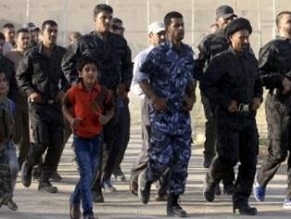|
World Jewish News

Shi'ite volunteers who have joined the Iraqi army to fight against the predominantly Sunni militants from the ISIS, southwest of Baghdad, June 24, 2014. Photo: REUTERS
|
Pentagon pushes back against Israeli critique of Iraq
24.06.2014, Israel and the World The Pentagon and State Department rejected criticism from Israeli officials on Monday that the US has inadequate security training programs, ostensibly demonstrated by this month's breakdown of the US-trained army in northern Iraq.
In a news report published Monday night, multiple Israeli officials— speaking on the condition of anonymity to maintain relationships with their American counterparts— said that Israel had internalized the collapse of the Iraqi security forces, funded by billions of US dollars, to the Sunni terrorist militia known as ISIS.
Those officials said ISIS' territorial gains across the region reinforced Israel's position to maintain an IDF presence in the Jordan Valley— and undermined a US security plan for the natural borderland, proposed as part of a two-state solution between Israel and the Palestinians.
The plan, which would replace the IDF with an international force, was put together by US General John Allen, who earned his stripes on counter-terrorism in Afghanistan and Iraq.
Responding to the report, one senior US defense official told The Jerusalem Post that the criticism fundamentally misread the security threats facing Iraq— and the contingencies facing the Jordan Valley, should peace come to pass between Israel and the PA.
"The [Iraqi Security Forces] is an army— a legitimate army," the official said, calling the Jordan Valley force a "gendarmerie." "The PA faces completely different threats altogether, and its a completely inappropriate comparison to make."
Israeli government officials making the comparison are "simply selecting facts to support their predetermined position," and cherry-picking, the official continued, while adding that ISIS poses a regional threat acknowledged by the Obama administration.
"I would ask them to look at the Iraqi security forces in and around Baghdad," he said.
Among the criticisms, officials in Jerusalem said that Israel's national security leadership watched as Iraqi forces “literally left their shirts on the ground and fled” when faced with a fight; and that Allen, one of the Pentagon's best-established generals, might not have the qualifications on which Israel would rely.
The Palestinians consider a permanent IDF presence in the Jordan Valley a non-starter in peace talks with Israel. The government of Prime Minister Benyamin Netanyahu has said repeatedly that a pullback from the river would make Israel impossible to defend.
In a statement, Pentagon press secretary Rear Admiral John Kirby told the Post that, "without getting into the details of the work General Allen has been doing on the peace process, I can tell you there is no other officer— active or retired— in whom Secretary Hagel places more trust or more confidence when it comes to understanding this part of the world and the dynamics of counter-terrorism."
"From Iraq to Afghanistan, General Allen has not only lived it, he has led it," Kirby said. "The results of his hard-won success speak for themselves."
Israel has relayed its concerns to the Obama administration through several channels, which, in addition to its security concerns, included fears over the stability of the Hashemite Kingdom of Jordan, as ISIS continues its advancement.
The Islamic State in Iraq and Syria seeks an Islamist caliphate across the region, reestablishing Sharia law and reshuffling a map drawn by the United Kingdom just a century ago. The group took control over a border crossing with Jordan this weekend.
State Department spokesman Edgar Vasquez called the comparison between the security threats to Iraq and the Jordan Valley "simplistic, and not relevant to the ideas that General Allen is developing in the security dialogue with his Israeli counterparts."
"We fully appreciate the security challenges that Israel faces," Vasquez said. "We’ve long said that the result of any peace negotiation needs to leave Israel more secure, not less. This is the principle under which General Allen and his team are operating."
By MICHAEL WILNER
JPost.com
|
|
